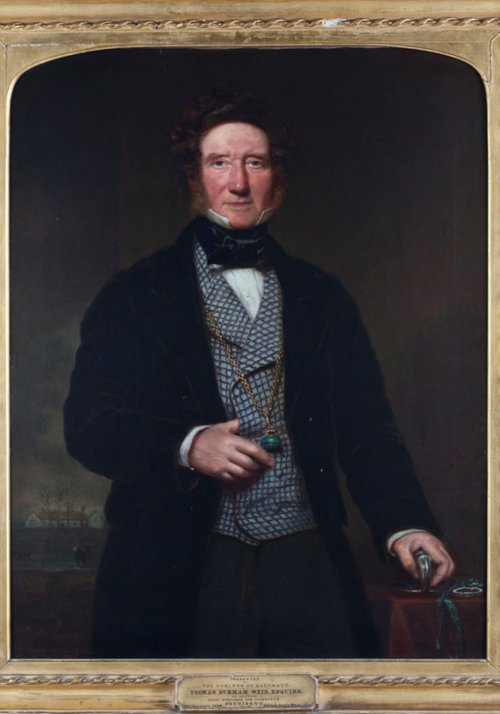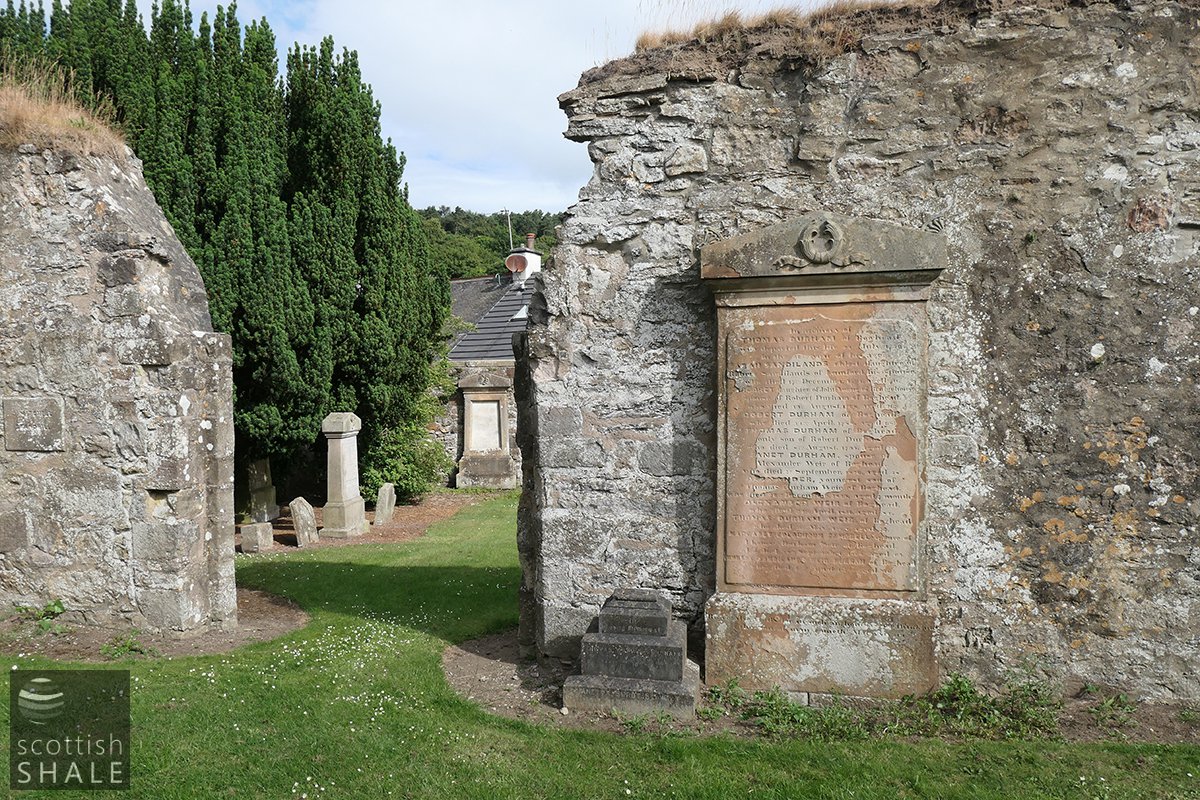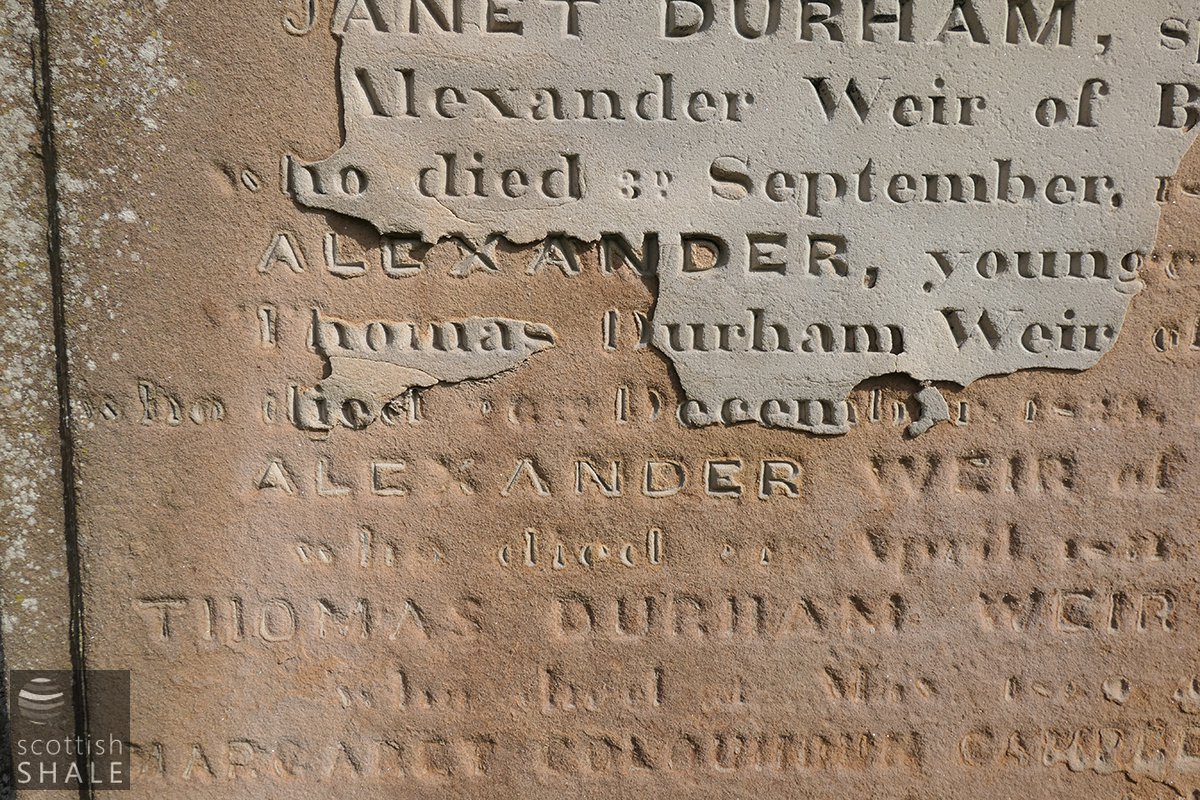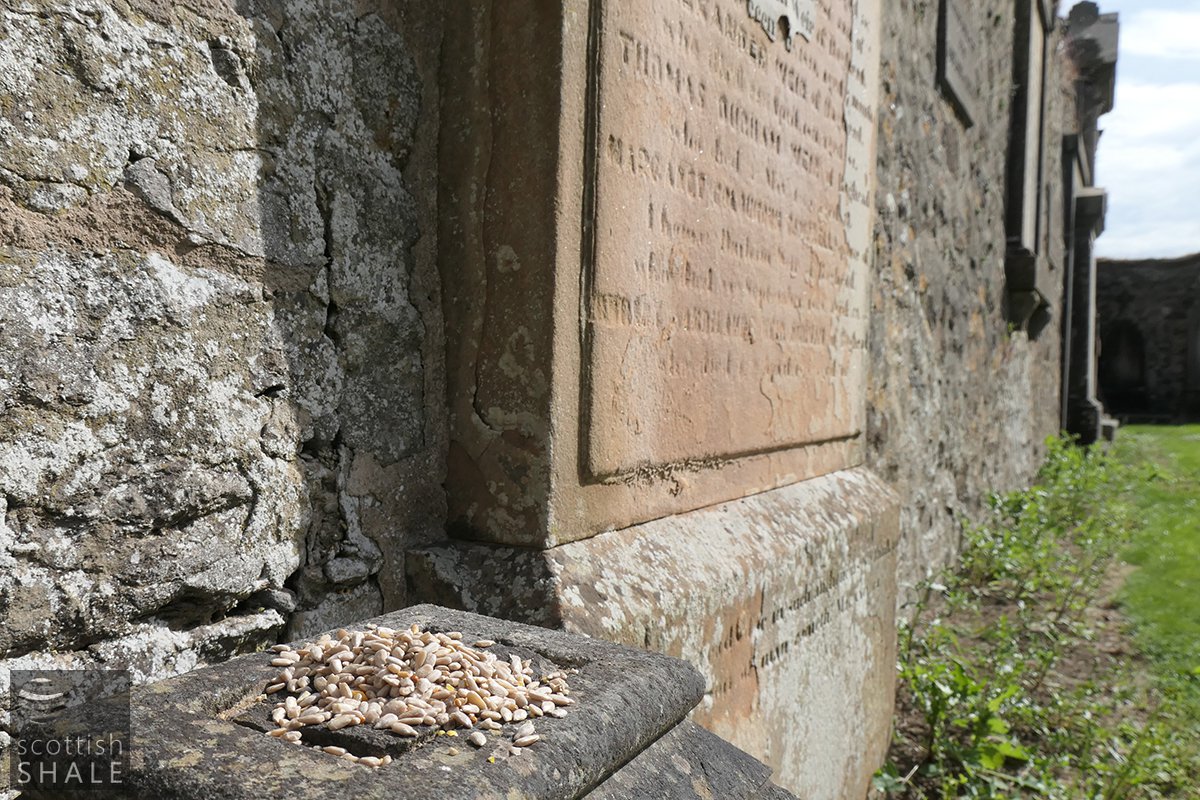Thomas Durham Weir (1792-1869)
Laird of the Boghead estate near Bathgate, where the Boghead Gas Coal (highly prized for gas and oil production) was first found.
THE LATE THOMAS DURHAM WEIR, ESQ OF BOGHEAD, BATHGATE.

On Monday last, in the Old Churchyard of Bathgate, the grave closed over the remains of a gentleman whose uame has long been familiar this district as a household word - Thomas Durham Weir, Esq. The removal from our midst of the esteemed and venerable laird of Boghead has occasioned much genuine sorrow, for the deceased was one who, from his personal worth, his kindly disposition, and his sterling honesty of nature deservedly enjoyed the good opinion, respect, and affection of all with whom he came in contact.
Mr Weir was born the 25th of October, 1792, and consequently at the time of his demise was in the 77th year of his age. Originally he was intended for the mercantile profession. With this view he served an apprenticeship in a banking establishment Edinburgh; but the death of his grandfather gave a new turn to his life.
The occurrence of this event placed him in possession, as nearest heir, of the estate of Boghead; his future life was that of a quiet, comfortable, and independent country gentleman, For the long period of 45 years he resided on his patrimonial property the mansion house of which was famous for its free and cordial hospitality.
Mr Weir was ardently attached to manly outdoor exercises; and in particular he was an enthusiastic curler - his fame as a supporter and follower of the “roaring game" being almost national. As president of the Bathgate club he took a warm interest in the achievements of our local "Knights of the broom." With his usual generosity he presented various gifts the shape of medals, &c., to be competed for among the members; and, altogether, not a little the success which has been attained in this district Scotland's great winter sport, was due to his ever ready patronage and personal example. In order to mark their sense of the gratitude they owed Mr Weir, the club presented him with two fine portraits —one of himself and one of his lady—by William Smellie Watson, R.A.
Mr Weir was devotedly attached to the study of Ornithology, and the collection of native birds and insects - most of them secured by his own persevering industry —which he has left behind him is admitted to be scarcely cxcelled in the whole country. By the leading naturalists of the day, he was recognised as no mean authority on this and kindred subjects. Thus we find that Professor M'Gillvray of Aberdeen, in his standard work, "A History of British Birds," frequently and in warm terms alludes to the valuable information had received from Mr Weir, and the late eccentric Mr Waterton was on many occasions similarly indebted to him. To our own columns he likewise often contributed excellent and interesting papers connected with the pursuits which was much attached. Mr Weir was a Deputy Lieutenant and Justice of Peace of the county of Linlithgow. In the latter capacity, while displaying invariable common sense and a sedulous determination to act with scrupulous equity, he exhibited the utmost leniency consistent with duty offenders the considerate and independent view took of cases brought before the licensing courts being particularly observable.
While he did not care about obtrusively interfering in public matters he proved himself a useful and energetic member of the community. He was, with short intervals, Chairman of the Parochial Board from the passing the Poor Law Act to the day of his death—the way in which he acquitted himself in this office meeting with general and merited acceptance.
On his estate, the celebrated mineral known as the Boghead coal was first discovered, and here also Mr Young erected the extensive works which have for many years been the centre of the paraffin oil trade. As a landlord, Mr Weir was considerate and indulgent to the extreme—as a friend, warm-hearted and constant—and as neighbour, kindly and courteous. Charitable to a degree seldom to be witnessed, he was unostentatious though liberal in his almsgiving ; and many a poor family will sadly miss the good old laird's benevolent face, and timieous, and freely offered aid. Though he has gone the way of all the earth, his memory, endeared by many acts of spontaneous and true-hearted generosity, and associated with all those qualities which are fitted to evoke respect and love, will long continue to be cherished, and to be spoken of with mingled regret and reverence.
In politics Mr Weir was a staunch Conservative, although never by word or deed sought to obtrude or force his political opinions upon others; in fact in this matter he allowed to all the same honest scope for conscientious conviction which himself took. The funeral on Monday was largely and influentially attended upwards of 300 mourners being present to pay the last melancholy token of respect to one who had all his lifetime enjoyed so much of their esteem. In conformity with a suggestion made by theTown Council,all the places of busiuess in Bathgate were shut during the afternoon; and the solemn cortege, as it passed along the street, was viewed with sad and touching interest. Among the carriages in the procession—which amounted in all to twenty-eight—we observed those of Sir Wm. Baillie, Bart, of Polkemmet; Mr Seton of Preston; Mr Baillie of Manuel; Mr Gillon of Wallhouse; Mr Meldrum of Dechmont, &c. Mr Weir's estate in the parish of Bathgate goes, we understand, to his eldest son Robert S. Durham, Esq., and that in the adjoining parish of Whitburn to Thomas M. Durham, Esq., his youngest son.
Falkirk Herald 12th June 1869


